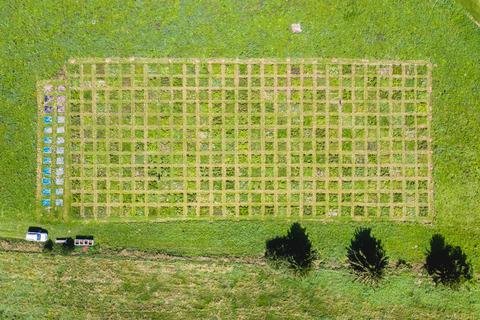当前位置:
X-MOL 学术
›
Funct. Ecol.
›
论文详情
Our official English website, www.x-mol.net, welcomes your
feedback! (Note: you will need to create a separate account there.)
Decomposition disentangled: a test of the multiple mechanisms by which nitrogen enrichment alters litter decomposition
Functional Ecology ( IF 4.6 ) Pub Date : 2020-05-14 , DOI: 10.1111/1365-2435.13560 Noémie A. Pichon 1 , Seraina L. Cappelli 1 , Santiago Soliveres 2, 3 , Norbert Hölzel 4 , Valentin H. Klaus 5 , Till Kleinebecker 6 , Eric Allan 1
Functional Ecology ( IF 4.6 ) Pub Date : 2020-05-14 , DOI: 10.1111/1365-2435.13560 Noémie A. Pichon 1 , Seraina L. Cappelli 1 , Santiago Soliveres 2, 3 , Norbert Hölzel 4 , Valentin H. Klaus 5 , Till Kleinebecker 6 , Eric Allan 1
Affiliation

|
Nitrogen (N) enrichment has direct effects on ecosystem functioning by altering soil abiotic conditions and indirect effects by reducing plant diversity and shifting plant functional composition from dominance by slow to fast growing species. Litter decomposition is a key ecosystem function and is affected by N enrichment either by a change in litter quality (the recalcitrance of the plant material) or through a change in soil quality (the abiotic and biotic components of the soil that affect decomposition). The relative importance of soil and litter quality and how the direct and effects of N alter them remains poorly known.We designed a large grassland field experiment manipulating N enrichment, plant species richness and functional composition in a full factorial design. We used three complementary litter bag experiments and a novel structural equation modelling approach to quantify the relative effects of the treatments on litter and soil quality and their importance for total decomposition.Our results indicate that total decomposition was mostly driven by changes in litter quality rather than soil quality. Litter quality was affected by the nutrient contents (N and calcium) and structural components of the litter (leaf dry matter content, fibres). N enrichment increased litter decomposition mostly indirectly through a shift in functional composition toward faster growing plant species producing higher quality litter. N enrichment also had effects on soil, by directly and indirectly affected vegetation cover, but this had relatively few consequences for the total decomposition rate.Synthesis. Our approach provides a mechanistic tool to test the drivers of litter decomposition across different ecosystems. Our results show that functional composition is more important than richness or soil quality in determining litter decomposition and that N enrichment effects mainly occur via above- rather than belowground processes. This highlights the importance of considering shifts in plant species composition when assessing the effects of N enrichment on decomposition.
中文翻译:

分解解开:对富氮改变凋落物分解的多种机制的测试
氮 (N) 富集通过改变土壤非生物条件对生态系统功能产生直接影响,并通过减少植物多样性和将植物功能组成从生长缓慢的物种的优势转变为快速生长的物种而产生间接影响。凋落物分解是一项关键的生态系统功能,它会受到凋落物质量变化(植物材料的顽固性)或土壤质量变化(影响分解的土壤的非生物和生物成分)的富氮影响。土壤和凋落物质量的相对重要性以及 N 的直接作用和影响如何改变它们仍然知之甚少。我们设计了一个大型草地田间试验,在全因子设计中操纵 N 富集、植物物种丰富度和功能组成。我们使用三个互补的垃圾袋实验和一种新的结构方程建模方法来量化处理对凋落物和土壤质量的相对影响及其对总分解的重要性。我们的结果表明,总分解主要是由凋落物质量的变化而不是由土壤质量。凋落物质量受营养成分(氮和钙)和凋落物结构成分(叶干物质含量、纤维)的影响。N 富集主要通过功能组成向更快生长的植物物种转变,从而产生更高质量的凋落物,从而间接地增加了凋落物分解。富氮对土壤也有影响,直接和间接影响植被覆盖,但这对总分解率的影响相对较小。综合。我们的方法提供了一种机械工具来测试不同生态系统中垃圾分解的驱动因素。我们的结果表明,在决定凋落物分解方面,功能组成比丰富度或土壤质量更重要,并且氮富集效应主要通过地上而不是地下过程发生。这突出了在评估富氮对分解的影响时考虑植物物种组成变化的重要性。
更新日期:2020-05-14
中文翻译:

分解解开:对富氮改变凋落物分解的多种机制的测试
氮 (N) 富集通过改变土壤非生物条件对生态系统功能产生直接影响,并通过减少植物多样性和将植物功能组成从生长缓慢的物种的优势转变为快速生长的物种而产生间接影响。凋落物分解是一项关键的生态系统功能,它会受到凋落物质量变化(植物材料的顽固性)或土壤质量变化(影响分解的土壤的非生物和生物成分)的富氮影响。土壤和凋落物质量的相对重要性以及 N 的直接作用和影响如何改变它们仍然知之甚少。我们设计了一个大型草地田间试验,在全因子设计中操纵 N 富集、植物物种丰富度和功能组成。我们使用三个互补的垃圾袋实验和一种新的结构方程建模方法来量化处理对凋落物和土壤质量的相对影响及其对总分解的重要性。我们的结果表明,总分解主要是由凋落物质量的变化而不是由土壤质量。凋落物质量受营养成分(氮和钙)和凋落物结构成分(叶干物质含量、纤维)的影响。N 富集主要通过功能组成向更快生长的植物物种转变,从而产生更高质量的凋落物,从而间接地增加了凋落物分解。富氮对土壤也有影响,直接和间接影响植被覆盖,但这对总分解率的影响相对较小。综合。我们的方法提供了一种机械工具来测试不同生态系统中垃圾分解的驱动因素。我们的结果表明,在决定凋落物分解方面,功能组成比丰富度或土壤质量更重要,并且氮富集效应主要通过地上而不是地下过程发生。这突出了在评估富氮对分解的影响时考虑植物物种组成变化的重要性。









































 京公网安备 11010802027423号
京公网安备 11010802027423号